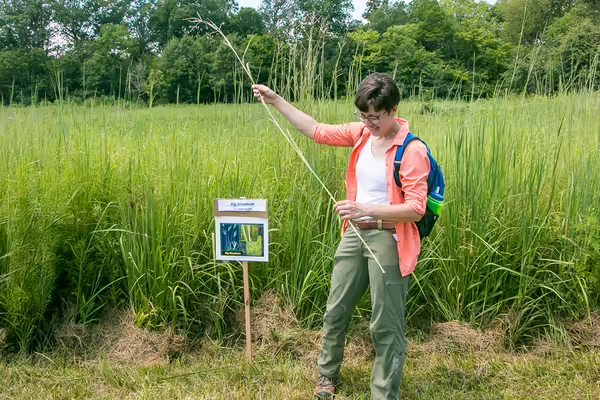
Global environmental issues like habitat loss and pollution can feel overwhelming. Can one person’s actions make a difference? Natural Resources, Environment, and Energy Educator Erin Garrett believes so. Garrett provides programs for southern Illinois in Alexander, Johnson, Massac, Pulaski, and Union counties to help people develop an appreciation for natural resources and to empower them to make small changes to make a positive impact.
What do you specialize in, and what motivated you to start working in that area?
I specialize in plant identification, specifically grass identification, native plants and pollinators, invasive species, and prairie ecosystems. My love of plants and prairies came after a college course where we were instructed to find a “sit spot” and observe a prairie for about 30 minutes. My eyes were opened to the beauty, diversity, and wonder of the prairie. After working three summers with The Nature Conservancy on prairies in Minnesota, North Dakota, and South Dakota, I went to get my master’s in plant biology to learn more, and that experience led me to an interest in public outreach and education.
What brought you to University of Illinois Extension?
I was familiar with Extension and the Master Gardener program and was excited about the opportunity to work for an organization whose mission I valued – bringing science-based education to the public. If you would have told high school me that public speaking would be a big part of her job, she wouldn’t have believed it! I’ve grown to enjoy sharing my passion for plants with others. It’s very rewarding to engage with folks of all ages from many different communities throughout Illinois and to help them develop a deeper appreciation for natural resources while empowering them to make small changes to positively impact their environments.
What does a day of work at Extension look like?
A little bit of everything! I may be writing a Grasses at a Glance blog post about how to identify a grass species, recording an episode for the Everyday Environment podcast, planning an upcoming Master Naturalist training, and checking on one of two food donation gardens under my management, all in a day!
What is a question you get asked a lot about the environment?
Many of the issues I address in my programs are large environmental issues – pollinator decline, habitat loss, invasive species spread, and so on. One of the main questions I get is, what can one person do? Does one person really make a difference? My answer is YES. Everyone has a role to play in sustaining our environment. Even small changes make a difference.
What are you looking forward to working on this year?
The Everyday Environment series is a fun project because it incorporates podcasts, blogs, webinars, and short videos from experts within and outside of Illinois Extension, all centered on a nature theme like climate change or water. A small team and I produce the series, and it’s always fascinating because I learn so much during the process, too. Learn more about the series at https://go.illinois.edu/EverydayEnvironment.
Extension’s natural resources, environment, and energy program provides research-based education for awareness and action to sustain healthy environments and ecosystems that support quality living and resilient communities. Extension staff empower people across Illinois to make a difference through the volunteer programs Master Naturalists, Climate Stewards, and Watershed Stewards. Have a nature question? Connect with your local Extension experts at https://go.illinois.edu/ExtensionOffice.
University of Illinois Extension develops educational programs, extends knowledge, and builds partnerships to support people, communities, and their environments as part of the state's land-grant institution. Extension serves as the leading public outreach effort for University of Illinois Urbana-Champaign and the College of Agricultural, Consumer and Environmental Sciences in all 102 Illinois counties through a network of 27 multi-county units and over 700 staff statewide. Extension’s mission is responsive to eight strategic priorities — community, economy, environment, food and agriculture, health, partnerships, technology and discovery, and workforce excellence — that are served through six program areas — 4-H youth development, agriculture and agribusiness, community and economic development, family and consumer science, integrated health disparities, and natural resources, environment, and energy.